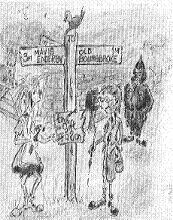My Google alert for ‘sonnet’ referred me to an article on John Williams, an American novelist of whom I had not previously heard.
He died in 1994, having completed a small body of work, novels that appear to be very different one from the other, at least superficially.
One of these was Augustus (1972), an epistolary-type novel about the first Roman emperor. The man is described by his contemporaries, friends, enemies and observers, in letters, diaries and official documents. It is technically accomplished, elegant in style and penetrating in its psychology, which cannot avoid being ‘modern’ and all the more interesting for that.
Augustus finally speaks for himself, as an old man, in a long last chapter, from which this excerpt particularly struck me today:
‘The young man, who does not know the future, sees life as kind of epic adventure, an Odyssey through strange seas and unknown islands, where he will test and prove his powers, and thereby discover his immortality.
The man of middle years, who has lived the future that he once dreamed, sees life as a tragedy; for he has learned that his power, however great will not prevail against those forces of accident and nature to which he gives the names of gods, and has learned that he is mortal.
But the man of age, if he plays his assigned role properly, must see life as a comedy. For his triumphs and his failures merge, and one is no more the occasion for pride or shame than the other; and he is neither the hero who proves himself against those forces, nor the protagonist who is destroyed by them. Like any poor, pitiable shell of an actor, he comes to see that he has played so many parts that there no longer is himself.’
He died in 1994, having completed a small body of work, novels that appear to be very different one from the other, at least superficially.
One of these was Augustus (1972), an epistolary-type novel about the first Roman emperor. The man is described by his contemporaries, friends, enemies and observers, in letters, diaries and official documents. It is technically accomplished, elegant in style and penetrating in its psychology, which cannot avoid being ‘modern’ and all the more interesting for that.
Augustus finally speaks for himself, as an old man, in a long last chapter, from which this excerpt particularly struck me today:
‘The young man, who does not know the future, sees life as kind of epic adventure, an Odyssey through strange seas and unknown islands, where he will test and prove his powers, and thereby discover his immortality.
The man of middle years, who has lived the future that he once dreamed, sees life as a tragedy; for he has learned that his power, however great will not prevail against those forces of accident and nature to which he gives the names of gods, and has learned that he is mortal.
But the man of age, if he plays his assigned role properly, must see life as a comedy. For his triumphs and his failures merge, and one is no more the occasion for pride or shame than the other; and he is neither the hero who proves himself against those forces, nor the protagonist who is destroyed by them. Like any poor, pitiable shell of an actor, he comes to see that he has played so many parts that there no longer is himself.’

No comments:
Post a Comment